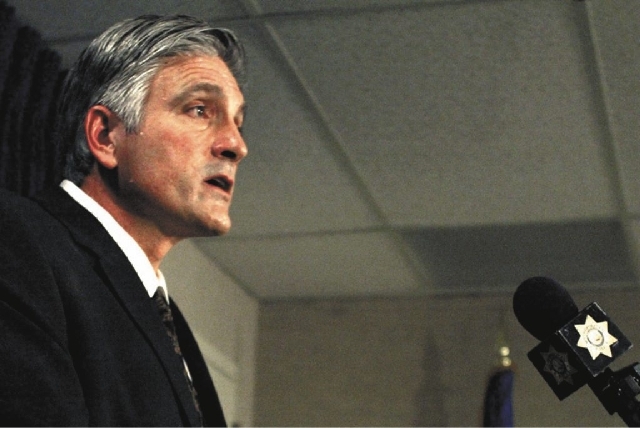Former senior cop says sheriff undermined integrity of shooting reviews
Las Vegas police officers will not have the public’s trust until the department has a credible process for reviewing its own shootings, former Assistant Sheriff Ted Moody said Monday.
Moody thought the department had found the model. He’s just unsure whether they will let it work.
In his first public comments since his abrupt retirement last month, Moody told the Review-Journal that Clark County Sheriff Doug Gillespie undermined the integrity of the Use of Force Review Board, the department’s internal review of shootings and other serious uses of force by its officers.
Moody said he couldn’t continue after Gillespie rejected the board’s unanimous recommendation to fire officer Jacquar Roston. Moody was co-chairman of the board and led its overhaul last year.
“This was a fork in the road for me. I knew that my decision was in large part going to define my career. Either I was going to stand up for principles that I strongly believe in, and for the people who believed in me, or I was going to stand with Mr. Gillespie behind a decision I knew was a very bad one, that was going to harm the best officers of this organization and the community,” Moody said.
The Use of Force Board is a panel of four civilians, three officers and two nonvoting chairmen. The civilian members are chosen from a pool of 18 and the members rotate every hearing.
Moody said a trustworthy review process separates good cops, who usually make correct decisions, from the small minority of cops who don’t.
The process must be stable, impartial, unbiased and free from political interference.
“Anything short of that is going to fuel further suspicion and mistrust and is just begging for the imposition of externally imposed oversight,” he said. “Nobody wants that. We can be better than that.”
SHERIFF DISAGREED WITH BOARD
Moody, 52, announced his retirement on July 24, two days after Gillespie announced his decision on Roston, who shot an unarmed man in the leg in November.
Roston was combative and unapologetic for his actions during his April hearing with the Use of Force Review Board and told members he wouldn’t change how he handled the incident.
During a pre-termination hearing a month later, Roston changed his tune and took responsibility for his actions. That board recommended a weeklong suspension, the most severe penalty short of firing, and Gillespie agreed.
But Moody said the pre-termination board, which is made up of three officers, is more sensitive to internal politics. And he said it exceeded its function as a procedural hearing.
“The role of the pre-term board is not to conduct an entirely new, duplicate hearing,” he said. “If some new evidence came up that changed the original finding, I’d be the first one standing up and saying, ‘Hang on a second.’ But there was no new evidence. It’s just different people looking at the same evidence.”
The Use of Force Review Board, on the other hand, conducts a comprehensive review.
“How do you compare that to an internal, insular panel of three people? How do you put the two on equal footing? It makes no sense,” he said.
Moody wouldn’t specifically comment on any “political interference” in Roston’s hearing.
“I don’t think Gillespie’s decision had anything to do with the facts in the Roston case. But this is not about my opinion,” Moody said.
But others have accused Gillespie of caving in to the Las Vegas Police Protective Association, the union for rank-and-file officers.
Robert Martinez, 57, was the civilian co-chairman of the board. He and five civilian members resigned last week.
“(Gillespie) invalidated everything we did and turned it into a political thing. He bowed to the PPA,” Martinez said last week. “He wants to be sheriff again, and he can’t be the sheriff without having the PPA on his side.”
Chris Collins, executive director of the PPA, laughed off those comments last week.
“For someone to say that hasn’t been watching. ... (Gillespie) certainly doesn’t bow down to the PPA. I wish he did,” Collins said.
Gillespie did not return a late message seeking comment.
MORE TRANSPARENCY
Moody said his resignation was not specifically about Roston.
“This is about the credibility of the process as a whole, which is critical to the future of Metro and the larger community,” he said.
The changes to the Use of Force Board came in the wake of a federal review into the department’s use-of-force policies and publication of a Review-Journal series, “Deadly Force,” an investigation of police shootings. Both the Justice Department and the newspaper found the board lacked transparency and didn’t hold officers accountable.
Before the changes, the board determined a shooting “justified” or “unjustified.”
Under Moody’s watch, the department changed the classifications to “administrative approval” and “administrative disapproval” and started scrutinizing the officers’ tactics, decisions and training.
The changes were aimed at examining the totality of the officer’s actions rather than simply issuing a blanket approval or rare disapproval.
Before the changes, no officer in an on-duty shooting was ever recommended for firing.
Since the changes, there have been two: Roston and Jesus Arevalo, who shot and killed Stanley Gibson in December 2011.
CONCERN IN WASHINGTON
Moody’s resignation was already turning heads in Washington, D.C.
Joshua Ederheimer, acting director of the Justice Department’s Community Oriented Policing Services (COPS), said he was briefed on the situation by Gillespie.
It delayed the release of COPS’ six-month status report on the implementation of their suggestions. It was expected last month.
“Even though the report’s completed, we’re going to take extra time to make sure we reference this,” Ederheimer said. “We want the public to know the Department of Justice is aware of what’s happened.”
A more complete review of Moody’s departure and the board resignations will be completed in another COPS report, due at the end of the year, he said.
One of the questions Ederheimer’s office will ask is whether the civilian members understood the scope of their review or whether they resigned because their expectations were inflated.
But Ederheimer said the department showed more transparency in revealing details of Roston’s shooting than in previous years.
“That we’re observing robust public debate about this speaks to the fact that the process is so much more transparent than it used to be,” he said. “I think that’s healthy.”
Moody said he’s unsure what his next step is. There have been rumblings that the 30-year veteran would run for sheriff, but Moody said he hasn’t made a decision.
“That’s a question my whole family will have to answer.”
Contact reporter Mike Blasky at mblasky@reviewjournal.com or 702-383-0283. Follow @blasky on Twitter.




























